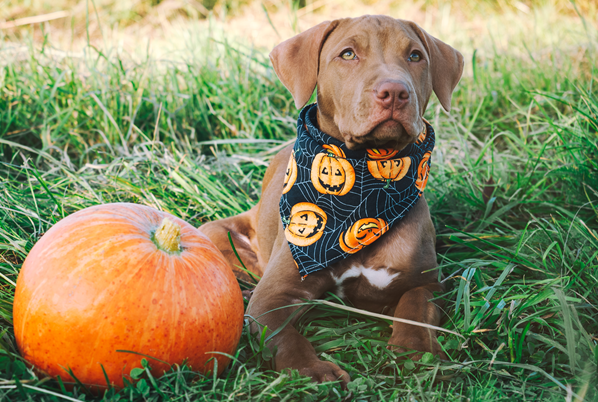
Halloween can be a ton of fun for pet owners and pets alike—but it can also be a spooky time for your furry friend if we’re not mindful of safety. With these tips, you can enjoy Halloween festivities with your pets while making sure they stay safe and happy.
Keep Costumes Cute and Comfortable
Sure, that taco costume looks adorable, but not all pets love dressing up. Before putting your pet in a costume, think about their comfort and safety. Pick a costume that fits well and doesn’t restrict their movement, breathing, sight, or hearing. Look out for dangling parts or tiny decorations that could tempt your pet to chew, which can quickly turn into a choking hazard.
Pro tip: Watch for subtle signs that your pet is uncomfortable, like frequent yawning, licking their lips, or trying to shake or scratch at the costume. If they’re showing signs of stress, skip the elaborate outfit and go for a festive bandana instead—it’s just as stylish and way less restrictive.
Treats for Humans, Not for Pets
Halloween is filled with delicious treats, but many are dangerous for pets. Chocolate, xylitol (found in sugar-free candy), and raisins are all highly toxic to dogs and cats. Candy wrappers can also be a hazard if swallowed, potentially causing intestinal blockages.
Instead, treat your pet with something safe, like pet-friendly snacks or pumpkin puree (not pumpkin pie filling). And remind trick-or-treaters not to share their candy with furry friends—no matter how much they beg!
Spooky Décor, but Make it Safe
Halloween decorations are fascinating to curious pets, but many decorations pose risks. Lit candles inside jack-o’-lanterns, for example, can lead to burns or even fires if they are accidentally knocked over. Glow sticks, while not toxic, can cause your pet to drool excessively or even vomit if chewed.
When decorating, keep potentially hazardous items out of reach. Go for battery-operated candles in pumpkins to avoid fire risks and secure any hanging decorations or cobwebs to prevent curious pets from getting tangled up.
Manage Stress and Anxiety with a “Safe Zone”
All the hustle and bustle of Halloween can overwhelm pets, especially with all those strange costumes and visitors at the door. To help your pet relax, set up a quiet, secure room where they can escape the noise and excitement. Add their favorite blanket, a few toys, and even some calming music to create a peaceful retreat.
If your pet is particularly sensitive to noise, consider using a calming vest or pheromone diffuser. For especially anxious pets, it’s a good idea to have a quick check-in with your vet about anti-anxiety aids.
Pro tip: Watch out for anxiety signs. Subtle indicators that your pet is stressed include pacing, panting, hiding, or even excessive drooling. If you spot these signs, give them some space and keep the Halloween commotion at a distance.
Keep Pets Secure to Prevent Escapes
Between doorbell rings and the parade of costumed guests, Halloween is prime time for pets to slip out unnoticed. Keep them safely inside and away from the door to prevent any accidental escapes. Use gates, crates, or closed doors to keep them secure while you hand out treats.
Make sure your pet has updated ID tags, and if they aren’t microchipped yet, consider it before Halloween. You may also want to snap a recent picture of them in case they manage to dash out the door. With so many people outside, a well-labeled ID tag is the quickest way to get your pet back to you.
By planning ahead and keeping these safety tips in mind, you and your pet can enjoy a fun, stress-free Halloween! Whether they’re dressed as a bumblebee or just enjoying the sights and sounds from a cozy corner, a little preparation will ensure your pet has a “pawsitively” safe holiday.
